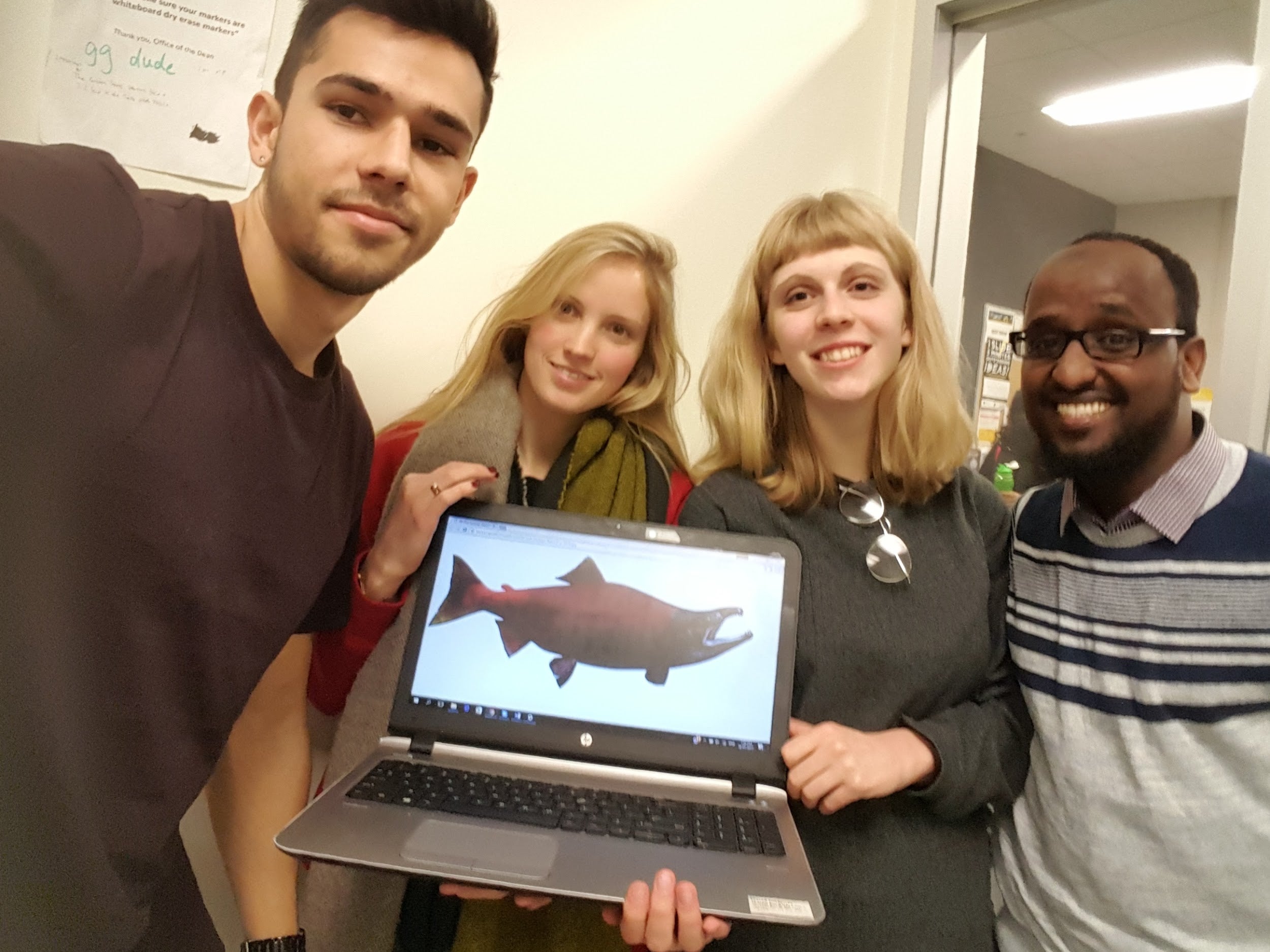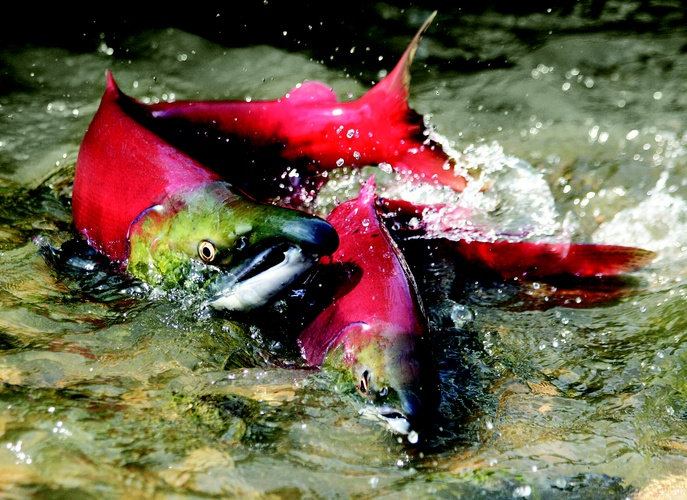
On January 12th, 2017, the International Development 101 class was presented with a documentary as part of the weekly lecture series that seeks to engage students in examining different development issues. The documentary entitled Salmon Confidential (2013), highlights the death of millions of sockeye salmon fish before they spawned in the Fraser River, British Columbia, beginning in the mid-1990’s. A team led by Dr Alexandra Morton, a prominent biologist based in British Columbia, took it upon themselves to investigate this unexplainable phenomenon. Being a keystone species in many ecosystems and invaluable cultural icon to First Nation Tribes, sockeye preservation is deemed critically important.
Upon striking decline in the numbers of salmon, the Department of Fisheries (DFO – Canada), in 2006 tasked Dr. Kristi Miller to examine the cause of the dwindling numbers. Millers findings showed a strong correlation between the complications present in the dying salmon and Salmon Leukemia, a retroviral disease that ravaged through salmon farms around the world in the 1990's, when commercial industry was first established. This ultimately pinned commercial salmon farms as being a source of the diseases that spread to wild salmon. After the findings were published, Dr. Miller faced severe restrictions, limiting further research and use of DFO labs. Biologists were left with sending samples for testing to the top internationally renowned foreign labs to further investigate the viruses. Three viruses were positively identified: Infectious Salmon Anemia (ISA), Piscine Retrovirus (PRV) and Salmon Alphavirus. The symptoms correspond with those associated with ISA virus, which was the most documented of the salmon diseases in the Fraser River. ISA is a highly communicable disease affecting salmonids causing mortalities in farmed and wild salmon across the globe.

Perhaps the most intriguing part of the documentary was the Government's hard fought efforts to conceal the true underlying reasons why the salmon Fish population was declining. Their reasoning included ‘overfishing’ and ‘water scarcity’. This is actually the genesis of the whole fiasco surrounding salmon fishing that led to independent investigation by Dr. Morton. The government’s reaction to the findings of Dr. Morton's and other leading researchers were baffling. Why is a government agency in a democratic society like Canada conspiring with commercial farms to work against the citizen’s interests’ that it is supposed to protect? Forceful intimidation and the cover ups are against the basic principles of democratic society. Indigenous communities whose livelihoods mostly depend on the fishing of the salmon are most affected. It is clear from the documentary that the politics of land rights also come to play. The Indigenous community in BC have the rights to fish, the same way they have the right to land ownership. However, by allowing salmon farms on the fishing zone of the Indigenous people, the government is jeopardizing the economic, social, cultural and political welfare of the local communities. Favoring the international trade in the short run will have negative effects on the economic, social, cultural and ecological impacts on communities within close proximity in the long run.
Morton along with her colleagues continue to publish their findings on Fraser River’s Sockeye Salmon. One of their most recent publications outlines the harm of new aquaculture practices that involve cultivating wild salmon from marine waters. This minor change in location to where the farms are positioned has the ability to cause a larger threat to salmon’s migratory routes and increases the likelihood of farmed salmon exposing parasites or diseases to wild salmon.
Morton has still been actively fighting for BC’s fish. After this film was published, more aquaculture fisheries were moving towards wild sockeye migratory paths and infecting wild fish with the harmful parasites and diseases mentioned above. Morton, with the help of EcoJustice lawyers, filed a federal lawsuit to discontinue BC aquaculture companies from exposing diseased fish from wild salmon and sockeye. The ruling was passed in court and aquaculture companies were quick to drop their appeals of the decision. It is clear that the justice system agrees that ecological integrity should be upheld and respected by Canadian industries and governments. This ruling is a small victory and an achievement for Morton and British Columbia’s environment, however the horrendous practices of industrial farming of wild salmon continue to be a reality.
The Canadian government still prioritizes industry over local livelihoods. On February 24, 2016, Bill C-228 went to parliament. It discussed modifying the current practices of these fisheries so that they do not come in contact with wild salmon or other aquatic creatures. Unfortunately, Bill C-228 did not pass as government officials refused to acknowledge the evidence that aquaculture practices are causing serious damage to Canadian ecosystems. However, the bill will be reviewed at a further date.
This documentary did a splendid job by highlighting how the maintenance of a sustained balance within humanity’s wants is critical in preserving harmony between ourselves and the fragile environment. This film is relevant to the study of International development as it touches on topics such as the United Nations Sustainable Development Goals; in particular Goal 14, which advocates for sustainable development initiatives that promote conservation of oceans, seas and marine resources. Although increased efforts have yielded positive results within the past 3 years, the public continues to play a vital role through civil actions and social movements in securing the sockeye’s survival in BC, Canada.
Individuals who are motivated to join this cause can ‘Like’ their Facebook Page, fill out petition forms and also refrain from purchasing farmed fish at local supermarkets to support this cause. Conscious and collective efforts can drastically improve the future for Canada’s local communities. “That’s what’s so powerful, the relationship between the humans and fish are strong. That's why we need each other, that’s down to us.” - Alexandra Morton, 2013
Photo credits: Business in Vancouver